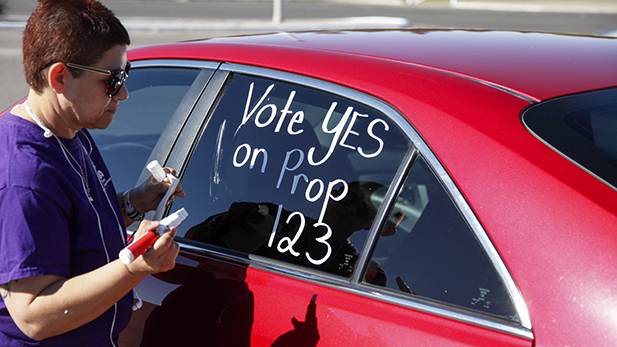 Sunnyside Education Association President Mary Martinez paints her car in support of Proposition 123 on April 4, 2016.
Sunnyside Education Association President Mary Martinez paints her car in support of Proposition 123 on April 4, 2016. Listen:
Sunnyside fifth-grade teacher Mary Ann Jester said she hasn’t had a raise in eight years.
That’s part of the reason she spent a Saturday in April pounding “Vote Yes on Prop 123” signs into Tucson street corners.
“Really the voters can send this message to our legislation that they’re not going to take underfunding education anymore, especially public education,” Jester said.
If Prop. 123 passes, it’s up to school districts to decide how the money is spent. Sunnyside’s governing board has committed to raising salaries. Nine other school districts also told AZPM teacher wages are a priority.
Jennifer Valentine teaches at Gallego Primary in the Sunnyside school district and said she is considering taking a second job outside of teaching– again.
“When I was in my 20s and my 30s I thought I could hang on, but I’m 46 and I plan on working for a long time, but it becomes a little scary to still be living paycheck to paycheck,” Valentine said.
Valentine said part of her paycheck goes back to her classroom. When her school’s copy machine was on the fritz last year, she spent hours of her own time and money to make copies elsewhere.

That isn’t enough to convince Vail parent Heather Morzinski to vote yes in May.
“My kids are in kindergarten and first grade, they’re very young,” Morzinski said. “When Prop 123 is over in 10 years my kids will be in high school and all of a sudden there is no funding to cover that.”
When Morzinski says Prop. 123 is over in a decade, she is talking about the amount of time the state could pull extra money from the State Land Trust fund to pay for inflation. Arizona's obligation to keep adjusting the base-level funding per student, however, does not end in a decade.
It’s for this reason, among others, Arizona State Treasurer Jeff DeWit has been the most vocal opponent of the measure at the Capitol.
This is already the school’s money, and so to settle this lawsuit all they’re doing is the Governor is taking this money from schools, giving it to schools up front,” DeWit said.
DeWit says while the trust fund has grown in the last four years, he’s worried the increased payouts would harm the permanent value of the fund. The state land trust makes money from investments in stocks and bonds and distributes a percentage of this to schools. The principal, the amount deposited into the trust after the sale of land, is not intended to be spent.
“The point of it is to grow this forever, because there’s a limited supply of land, once we sell the land it’s gone forever,” DeWit said.

"We’re taking money from our future so we can lower more taxes with our general fund,” Abraham said. The State has not passed a budget yet. Gov. Doug Ducey promised in his State of the State address and elsewhere to lower taxes.
However, there is no official ‘plan b’ from the legislature or the plaintiffs in the original lawsuit.
“A no vote brings nothing positive to the education funding conversation,” said Arizona Education Association President Andrew Morrill.
Morrill started as president the same year the organization became a plaintiff in the case that lead to Prop 123. He said that years of courts siding with schools did nothing to change the amount of money designated to schools each year.
“All the victories we had in the court process did not bring any funding to our students,” Morrill said.
Even with Prop. 123 money, Arizona’s per-pupil funding falls significantly below the national average. Supporters and opponents I talked to agree on one thing. With or without Prop. 123, Arizona needs to continue the conversation on education funding.



By submitting your comments, you hereby give AZPM the right to post your comments and potentially use them in any other form of media operated by this institution.